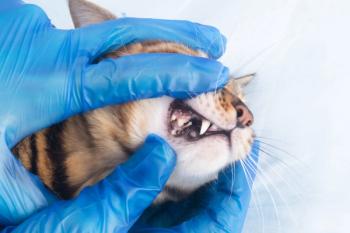
Veterinary dental experts warn about spring-loaded mouth gags
Device can lead to blindness in cats, studies show; safer alternatives exist.
Many veterinary practitioners and technicians have used mouth gags in cats and dogs for years. Spring-loaded mouth gags have often been used to help hold the mouth open, allowing for procedures in the oral cavity. However, Sandra Manfra Marretta, DVM, DAVS, DAVDC, says the device is no longer recommended.
Mary L. Berg, BS, RVT, RLATG, VTS (dentistry), sites a study published in The Veterinary Journal (2014) that showed spring-loaded gags generate constant force that could contribute to bulging of the soft tissues between the mandible and the tympanic bulla in cats. This force leads to the compression of the maxillary arteries as they course through the osseous structures. In cats the maxillary arteries are the main source of blood supply to the retinae and the brain.
"What the dental colleges are recommending now is no longer using those spring-loaded mouth gags during a procedure because it can impede on the maxillary artery if it's extended for too long of a period of time," Manfra said during a recent CVC lecture. "Initially, they (researchers) were thinking it was all secondary to hypotension from systemic hypotension. They did further studies to prove that it was having that mouth open too wide for too long."
The potential pitfalls of using spring-loaded mouth gags in cats:
> Reduction of the blood flow through the maxillary arteries to the retinas and brain could result in temporary or permanent blindness and, sometimes, neurologic abnormalities
> Masticatory muscle strain and injury to the temporomadibular joints
> Stretched tissues may make it more difficult to retract to allow for dental cleaning and tooth extraction
Berg suggests replacing spring-loaded mouth gags with a gentler option. By cutting the enclosed end off a 25-guage-needle cover and placing it between the maxillary and mandibular canines a new gag is easily created. Go to
Photo courtesy of Mary Berg
Newsletter
From exam room tips to practice management insights, get trusted veterinary news delivered straight to your inbox—subscribe to dvm360.





